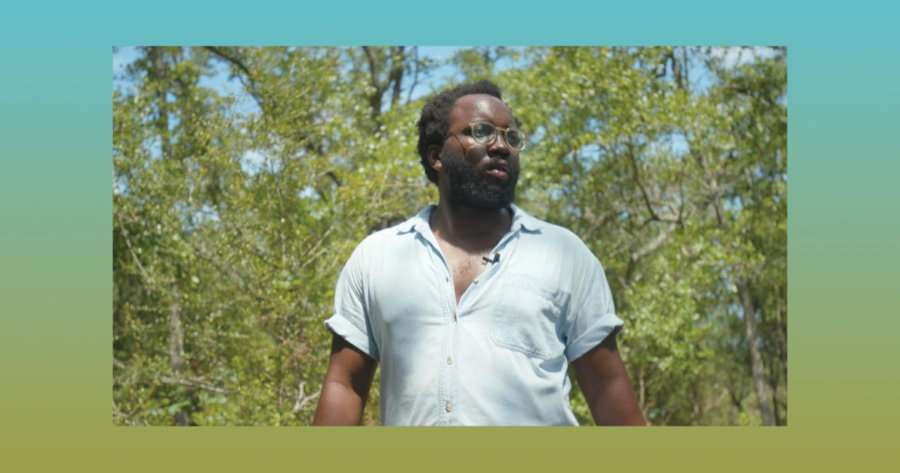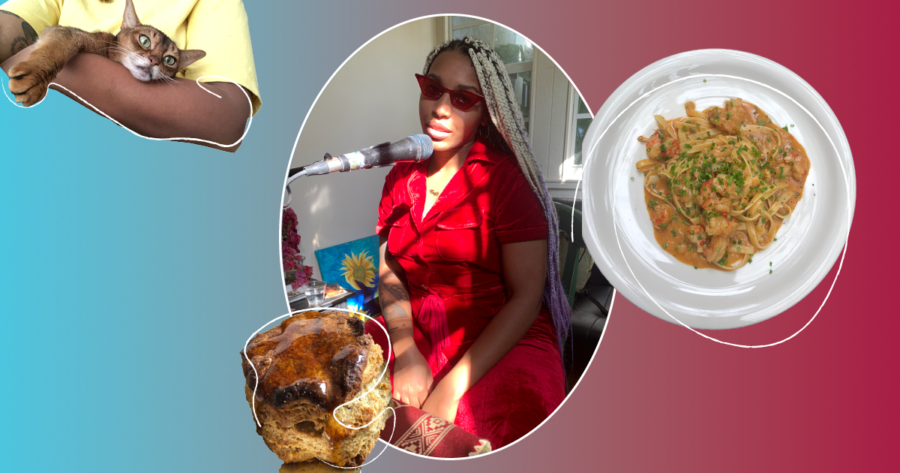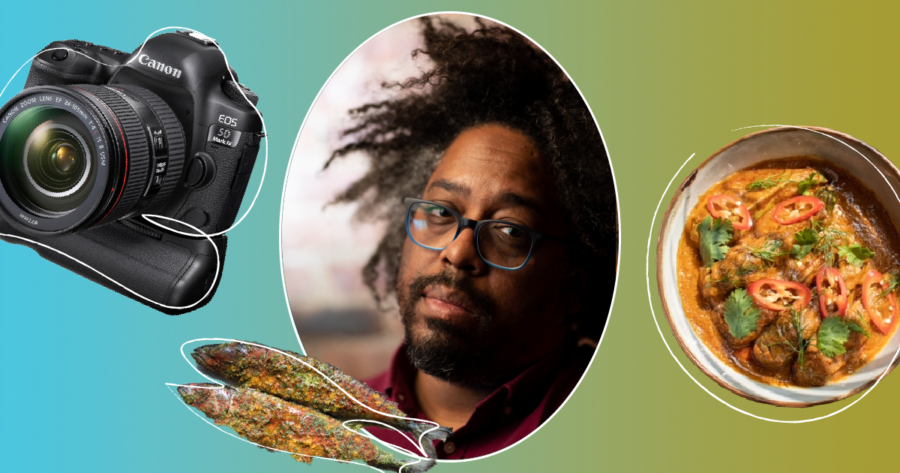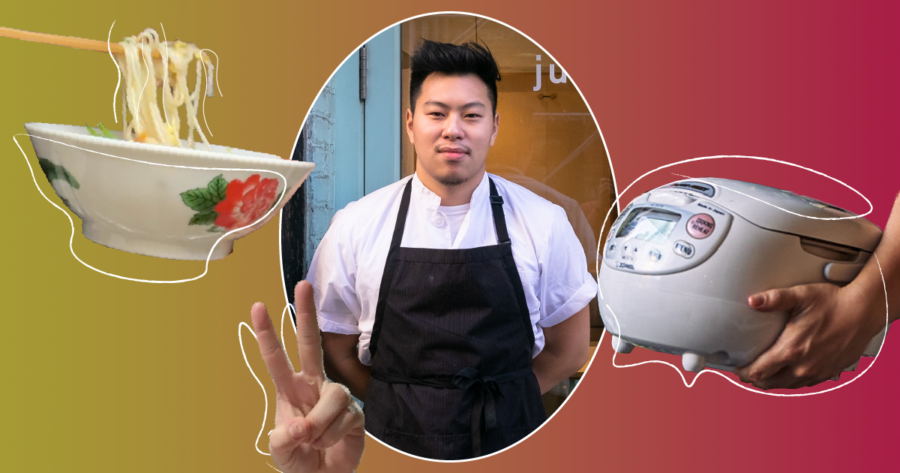INTERVIEW
Tunde Wey Wields Food To Fight The New Normal
BY VICKY GU
MAY 20, 2020

PHOTO COURTESY OF TUNDE WEY
Lagos-raised and New Orleans-based, chef and writer Tunde Wey works to change systems through social experiments. While unpredictable in nature, his prolific pop-ups have at least one thing in common: using food and dining spaces to challenge the balance of power and equity. A few of his projects—
Saartj highlights racial wealth disparity by offering race-based tiered pricing to customers. Hot Chicken Shit sells chicken at extortionist prices to combat housing issues from gentrification. Dinner series Love Will Trump sparks romantic connections between US citizens and immigrants.
We chat with him on the imperative of food equality, success metrics for intangible work, ambivalence on media recognition, and the relationship between social dissent and internal joy.
Vicky: Hey, Tunde. Thanks for making the time, and I'm excited to talk. I'm now thinking back to how I first discovered you from a Bon Appetit article in January 2019. Feels ironic, given the recent flare ups in food media, which I’m curious to hear your take on. Your dinners and initiatives focus on how we're thinking about food. So, how would you translate that to what we're reading about food?
Tunde: Let me start with a topic that’s important to me right now: economic equity, a global redistribution of wealth and resources. Being here in the United States, I'd say between white folks and folks of color. Specifically, black folks, indigenous folks, brown folks. But this also applies to places of conflict, globally, and what it looks like to reconcile conflict in such a way that there is freedom and justice.
I know that all sounds grand, but I'm not talking about a utopia. I just think that we need to talk about the fundamental problems more. If you don't have the food, your daily bread—it's very difficult to think about other things. And there are so many people in this position where just meeting daily needs is impossible. This isn't the result of happenstance; this is the way it's been engineered.
I'm interested in reverse engineering this discriminatory system, and that's where food plays a very important role. Food is elemental and fundamental. If we can solve for not just hunger, but access, and fair wages—those are steps in solving for global disparity.
That's a ridiculous scope of an answer relative to the question, but that's the shit I think about. That's what woke me up today at four-thirty in the morning.
Actually, that's a better primer to talk about your work, which has always addressed issues that audiences are now starting to take seriously. For the first time, a lot of people who come from privileged backgrounds—whether white or not—are finding themselves in a new moral imperative because COVID has accelerated these conversations. How has the current landscape of public health affected your work? Have people become more receptive?
Honestly, because of the nature of my work and how the media works, it's hard for me to gauge reactions. Before COVID, say I get a press writeup. I can see who's liked the post on my timeline, and if I'm feeling adventurous, I can look at Twitter comments. But, none of that truly measures the engagement of my work.
They are reactions of the media moment, and the way that we organize socially is to be a part of these cycles of moments. I mean, the recognition is great. It soothes my ego. But my work is about things being changed, and that's hard to discern, especially from social media.
I've recently begun to think of my work differently—to see it as a historical record of dissent, an archive for posterity. To archive the fact that not everybody was down with the restaurant bailout, or that not everyone believed that dining spaces could be used to organize for the benefits of immigrants. I want to complicate the existing narratives, which so far has happened through dissent, and my only expectation is that it serves some purpose in the future. That the history of those memories are richer than what it would have been if my work didn't exist.
That way, I'm free from all those metrics that might otherwise have the power to motivate or inspire or deflate me in the moment of actually trying to do the work.
That sounds like a good mindset towards reception. In the sense of audience engagement—I agree that the metrics that are more meaningful in the long run are more of those qualitative ones, as opposed to the quantitative, where it’s often focused on how people are instinct reacting to you in the moment. Archiving for the future isn’t an easy perspective to maintain, but it's important.
Thank you—that was a great way to say it more succinctly.
I completely feel that it's hard to verbalize these things. It's similar to what I'm doing with Currant, this food publication. It's young and figuring out its identity, but what I do know is that I want it to push people, to challenge them. I just don't think there's enough of that out there; it's still too easy for society to settle into complacency no matter the circumstance.
That said, it’s hard for me to gauge reception too, but the hope is that my work does change people. And that it would lead to changing systems, due to renewed ways that we relate to and treat each other in the world.
Even with the virus—and this I can see around me in New York—I'm watching people settle into their new normals, which might be new crazies, or at the least, new steady tensions. But there's a privilege that's inherent to the settling. I don’t think we realize that our tensions manifest in different degrees, depending on where you are in the spectrum of economic inequality.
Exactly. Can you use that as my direct quote?
[Vicky laughs.] Of course. This conversation will actually be published as your personal monologue.
I’m also curious—what motivates you to do the work that you do? I know part of it is inexplicable, unexplainable. You can’t explain why you wake up at four thirty thinking about these things. But what are some of the factors that shape it? I think hearing about specifics might help audiences think back to their own lives, as they gain a sense of, “What are the types of experiences that I’m not even exposing myself to—that would force me to see things differently?”
Honestly, I didn’t see it through specific reasons at first. I’ve been in therapy for a year and a half now, and my therapist often comments about why I've chosen to do this particular kind of work, and why I feel this need for justice. For him, I think it’s connected to previous trauma or something.
That’s one part. The other part is that I consider myself vulnerable and I’m still very much connected to people who are vulnerable. My financial vulnerability feels real, in that if I can’t pay my rent, I may not be homeless, but I’ll be living in someone else’s home. Up until around ten months ago, I was in this weird immigration limbo. I wasn’t documented, but I wasn’t undocumented, and before that I was undocumented for like ten years. My brother is a DACA recipient and that status is under threat. My parents live in Nigeria, in deteriorated economic circumstances compared to when I was younger.
These are my family, so these are the things I think about. My proximity to the problems makes me angry, but I also think that theoretically and intellectually, it’s a problem.
And that anger comes from the realization that—back to the initial point that I was making—these balances or imbalances of power are not accidental, they're engineered.
I don't call my work charity at all. I think that you can only do charity work when you fundamentally feel a sense of benevolence, a sense of righteousness. But, because of this inequality, I don't feel any benevolence. I don't feel any righteousness. I just feel rage.
I know that this is not a process that is impersonal. The process that I create, the inequality that I suffer from relatively and that other people suffer from greatly. The process is very specific. And it's ruthless. And so that makes me rage. That’s my response to the question. It's anger, and proximity to the problem.
And according to Josh, some childhood trauma.
[Vicky laughs.] Childhood trauma, sounds familiar. But also not to diminish its impact—it is a big part of what makes your personhood valuable to the larger dialogue.
I want to talk more about your previous point on challenging narratives—I think the idea of dissent as a freedom is important, but it can be tough to be on that side. So on the flip side—what brings you joy?
Right. What brings me joy? Well, how do you define joy?
For me, my faith interweaves with this a lot, especially with the stage that the world's at. I'm figuring out what joy means in the context of whether I'm in a place of abundance or in a place of need. And I think it's the roots in spiritual security and satisfaction, no matter the shifting external factors.
I mean, I started freelancing a bit before this all happened, so I've learned a lot from being in a new financial unpredictability. My roommate—and one of my closest friends here—moved out, so I'm coordinating next steps while in between roommates for a bit.
That, that sounds like a blessing.
[Laughs] It is, it is great. Solitude is nice. But anyhow, I think joy for me is about redefining the things that I currently pursue for it, like work accomplishments and social standing and financial security. And then realizing that if I lean on all of that for my joy, it's unsustainable, because those will all fade. So how can I be content with what I have and where I'm at?
So your spiritual faith is what brings you joy? That's what helps you maintain that sense of equanimity in spite of everything?
Yeah, relationship with God, but also in tandem with keeping good people around me.
Yeah, the people. So, you're a Christian?
Yes, I am.
What denomination?
I'd say non-denominational. I grew up in a Chinese American faith tradition, and they didn't really discern much between denominations. Probably too many complicated English words.
Well, I'm glad I asked you that, so I know what kind of joy you’re referring to. I think what brings me joy is the moments when I'm at peace with myself. That happens usually after I write or produce or cook something, but also generally after just spending more time with myself. It’s the sort of spiritual groundedness that comes after a long walk. But it's also difficult for me because it’s one of the things I’m most afraid of.
Expanding on that—can you talk about when you produce or cook something? What are those moments when you think, “Wow, I’m doing something”? When you might feel a sense of success?
In the moments when I host dinners—after the dinner, I just feel this immense gratitude for the world and for the people who came to my dinners. For myself, for creating a life where I can do the world that makes me grateful.
Of course, there are also those moments like being featured in TIME magazine. I need the media recognition, because it makes my work tangible, and it gives me a leg to stand on when I’m talking to others about future work. But I also can’t help but think about how fake it is. I’m not disrespecting the publications here, but I’m thinking about fakeness in the idea of media moments, and how we live in these fleeting cycles, powered by clicks and likes, powered by money.
So I’m eager for the attention but also ambivalent about its value. I’m not sure if that answers the question.
Honestly, maybe it wasn’t even a real question. Like, what constitutes success? I don’t think anyone—who carries out relational and largely intangible work—has the answers to that. Like what you said, we’ll take the affirmation, even if it’s through avenues we feel ambivalent about. Because they're measures of success that society currently defines as valuable.
Final thing—give us a recipe.
Hoisin Ish Crab with Jollof Rice
Rice:
Crab
Alliums
Jollof rice
Hoisin Ish Sauce:
Peanut butter
Moscato
Soy sauce
Fermented locust beans
Fish sauce
Puréed ginger
Salt
Pepper
Sugar
Mix all sauce ingredients. Cook till smooth. Heat up crab and alliums. Add hoisin ish sauce. Serve with jollof rice.
Sign up for Currantly, our newsletter delivering original food stories and news analysis, with surprise treats of freshly curated recipes and product drops. Think of it as your monthlyish digest to deepen your stance on food issues and be creatively inspired.
Vicky Gu is the Founder and Managing Editor of Currant. She's a multidisciplinary editor, designer, and strategist based in NYC, with roots in Dallas and Shanghai.
Sign up for Currantly, our monthlyish newsletter delivering original food stories and news analysis, plus fresh curations of recipes and product drops.


